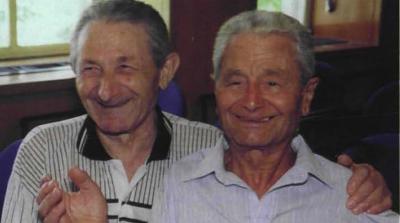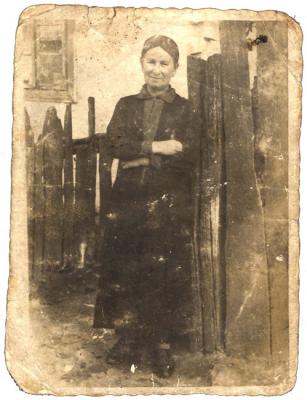“No, I didn’t die, I’m alive!”
This was Leonid (Leibish) Sheiman’s proclamation to his brother, Lazar, 59 years following each brother’s wrongful belief that he was the only surviving member of his family. Lazar, stunned, refused to believe his ears. Only when Leonid reminded him of how they had run for a full day to flee the first shellings of Lvov, was he convinced that he was speaking with his brother. That very evening Lazar, his wife, and daughter traveled from their Herzliya home to Kiryat Gat, a mere 80km drive, where Leonid was waiting outside his house in tense anticipation. There, the brothers passionately embraced—for the first time in 59 years.
This moving revelation was a direct result of the unique Pages of Testimony enterprise initiated by Yad Vashem’s Hall of Names, whereby the names of Holocaust victims are collected through the testimony of relatives and acquaintances.
The two brothers, who parted ways in 1941, were reunited after one of them filled in Pages of Testimony to commemorate his relatives, and the other subsequently asked members of the Yad Vashem staff to check if anything was known about his family.
“In 1991, my wife and I took a trip to Jerusalem and she suggested we pay a visit to Yad Vashem,” says Lazar, a Holocaust survivor who settled in Israel in 1957 and soon after began a family. “That is where we first encountered the Pages of Testimony that are used to gather victims’ names. I decided to fill in the Pages and commemorate the names of my parents, brothers, and sister.”
Leonid (Leibish) Sheiman lived in the FSU until he, too, came to Israel in 1995. “When my daughter immigrated to Israel three months ago, she heard about the Hall of Names at Yad Vashem. She talked me into writing them a letter, asking them to check if they had any details about the fate of my family.”
Thus, in June 2000, Rima Lehrmann and Ala Posternak, staff members at the Hall of Names, received an inquiry from Leonid (Leibish) Sheiman, written in Russian. In his request, he also reported what he knew about his family: the names of relatives, their years of birth, and town of origin, Tomaszów-Lubelsk.
Posternak searched the computerized database of Pages of Testimony and found seven Pages mentioning the names and dates that Leonid (Leibish) had cited in his letter. Affixed to each page was the signature of Lazar Sheiman. Lehrmann called Leonid to impart to him the news, then mailed the findings to him. However, even after receiving the reply letter from the Hall of Names together with copies of the Pages of Testimony, it took Leonid a week to muster up the courage to phone his brother.
“My wife answered the phone,” Lazar recalls, “and someone spoke to her in Russian. Since she didn’t understand a word, she asked me to take the call and translate for her.
“The man on the phone asked me if I had brothers. I said I used to but that all of them had died in the Holocaust. He asked me what their names were, and I began to list them: Haim, Shlomo. . . . He went on to recite the names with me and said, ‘and I’m Leibish!’” Stunned at first, Lazar did not understand what Leonid (Leibish) was trying to say.
“He asked me if I remembered my brother Leibish and what became of him,” Lazar recalls. “I said of course I remember him, but he died in the war. Then Leibish said, ‘No, I didn’t die, I’m alive!’”
Since that moving conversation, Leonid and Lazar have introduced each other to their families, children, and grandchildren, who were no less moved.
A month after the reunification of the Sheiman family, Lazar and Leonid visited Yad Vashem to share their experiences.
When recounting to the Yad Vashem staff how their family got separated during the war, Lazar explains: “When the war reached our area, the whole family fled inland, toward Russia. At first we were all together, but then they inducted Leonid into the Red Army and no one saw him afterwards. The rest of the family also scattered, and I carried on alone.”
After the war the two brothers searched for each other, but to no avail.
“We contacted all sorts of people,” says Lazar, “always getting the same reply—that no one in the Sheiman family had survived. Whenever my wife and I came across the name Sheiman, even in a phone book, we’d call up to ask. Maybe. . . .”
“I thought the only remnant of my family is this picture of our mother, which I always kept with me and which kept me alive,” Leonid adds, as both brothers clutch the picture of their mother.
They say they are slowly recalling their childhood experiences and sharing them with their children. Then, addressing the staff of the Hall of Names at Yad Vashem, who were privileged to have reunited the brothers, they add, “We don’t have enough words to thank you.”








